Black Clover Review
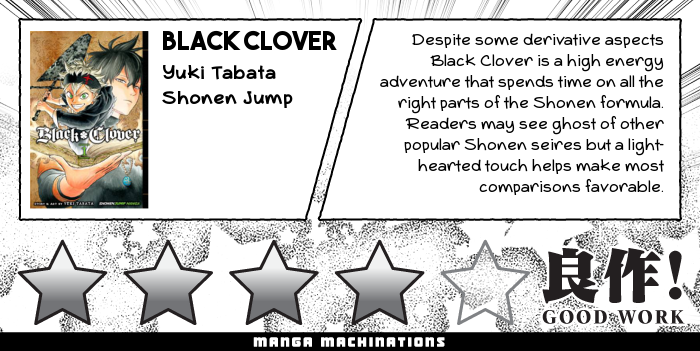
If you’ve heard about Black Clover by Yuki Tabata, you’ve likely heard about how derivative it is of Naruto, or maybe you’ve heard of how Shonen Jump is trying to push it and manufacture some sort of popularity. While I can’t speak to the marketing push or resulting fandom, I can speak to the qualities of Black Clover and why it’s my favorite battle manga. It’s a book with a lot of familiar elements, but one that focuses so acutely on the strengths of its characters and genre that any comparisons to juggernauts like Naruto end up being favorable.
Magic Naruto Competes with Magic Sasuke, Fights Magic Akatsuki, and Wants to be the Magic Hokage
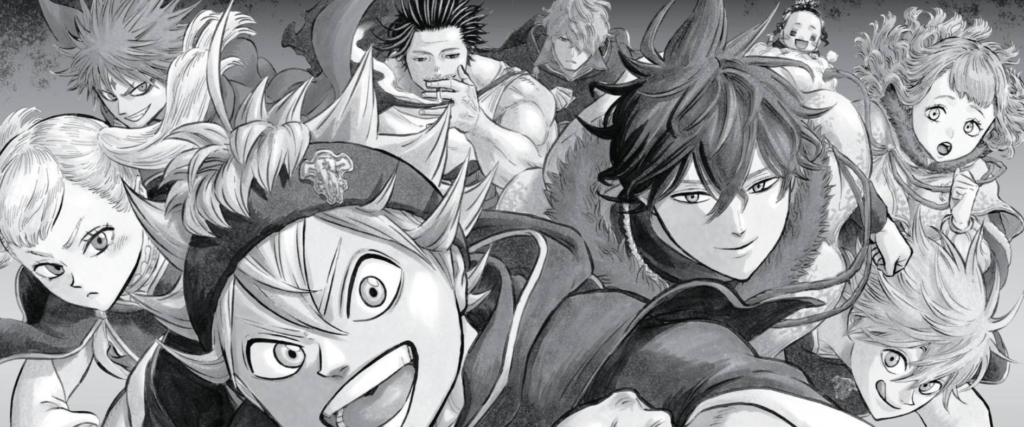
To speak extensively about Black Clover you either have to embrace the Naruto comparisons or attempt to exorcise them completely and not mention them at all. I personally enjoy the comparisons and they’ve given me a frame a reference to speak about the book to friends who don’t keep up with all the latest anime or manga. I have referred to Captain Yami as “Magic Kakashi,” the Wizard King as “Magic Hokage,” and the Eye of the Midnight Sun as “Magic Akatsuki.” I’ve done this jokingly in the past, but this has helped to describe what I like about the book to my friends. Asta’s humble beginnings and his grand aspirations are well-worn territory–as is his rivalry with the stoic and handsome Yuno. But Black Clover puts its stake in the ground with a light-hearted touch and the most enjoyable extended cast of characters in all of Jump.
You learn that Asta’s lot in life is tough–he was born with no magical powers, in a world where magical ability is as common as arms or legs. The book doesn’t directly express this as a disability, but there are some early mentions of how Asta would have trouble finding even basic work, let alone being a hero to the kingdom. If you recall Naruto and his orphan status, his reputation with the village, and his urge to be acknowledged, you might also recall the amount of time Naruto spends milking melodrama out of these sad events. You’d be surprised to hear Asta does very little moping, even when you watch the anime (where Naruto really became melodramatic for filler purposes.) Asta’s tough situation rarely gets him down and is merely one part of his persona. This isn’t done for some sort of tough-guy narrative where the story wants you to think Asta is a manly dude, but is portrayed as a defense mechanism and Asta’s most powerful tool for survival: unending optimism and faith in his friends. Similarly, his urge to become the Wizard King isn’t to make everyone acknowledge him, it’s because he wants to genuinely protect people and it’s simply the best way to guard everyone in the kingdom.
My favorite twist on the Naruto formula is the “Sasuke stand-in,” Yuno. Sasuke’s tale is largely about tragedy and radicalization–he doesn’t treat his friends very warmly, and he’s generally a dark character. Yuno seems very similar at first brush (and the book directly plays with these expectations,) but you learn quickly how good a friend Yuno is. Yuno and Asta’s relationship is very positive and aspirational–they compete with and push one another, but they also defend and advocate for each other. This doesn’t happen as some sort of comedic tsundere routine; they honestly and openly talk fondly of their friends.
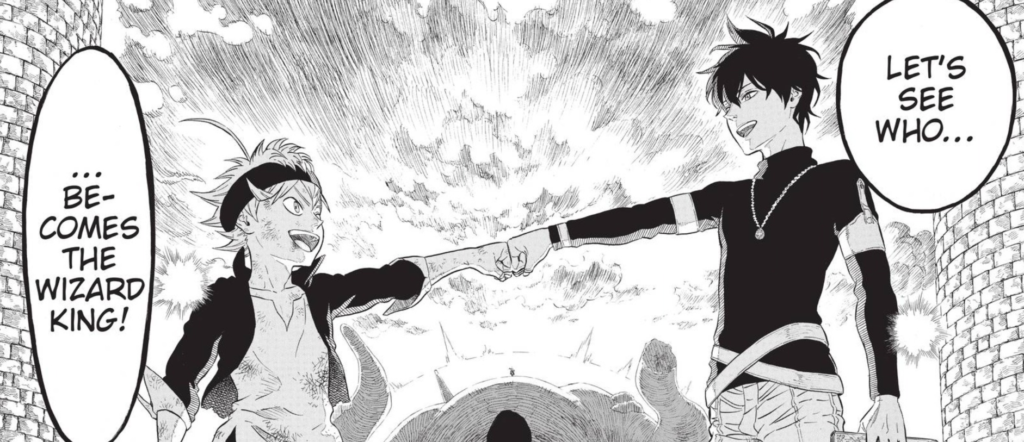
Even the origin of Asta’s combat abilities are a nice riff on age-old shonen tropes. Through a series of dramatic events he is granted a grimoire and a unique power. These grimoires are usually awards as part of a ceremony. Asta was publicly denied one by whatever forces choose their owners, but this new grimoire flies to Asta seemingly out of nowhere and allows him to summon an anti-magic sword. Suddenly, the tables turn and Asta is an abhorrent force to be reckoned with. Nearly every person of note in this series is powerful because of their massive magical abilities, but Astas new sword literally cuts through and dispels them all. He is ridiculously strong, but not on the same “power level” metric everyone else uses. He bypasses it and fights with a different and unique style. This shows the reader that Asta’s still an outsider, but one that is built from the ground up to create upsets and comeback victories. Asta doesn’t revel in humiliating nobles and holier-than-thou wizards–but the creator sure does. This is the Naruto vs Neji fight distilled and bottled, for your shonen drinking pleasure.
Formulaic Arcs Are My Magic
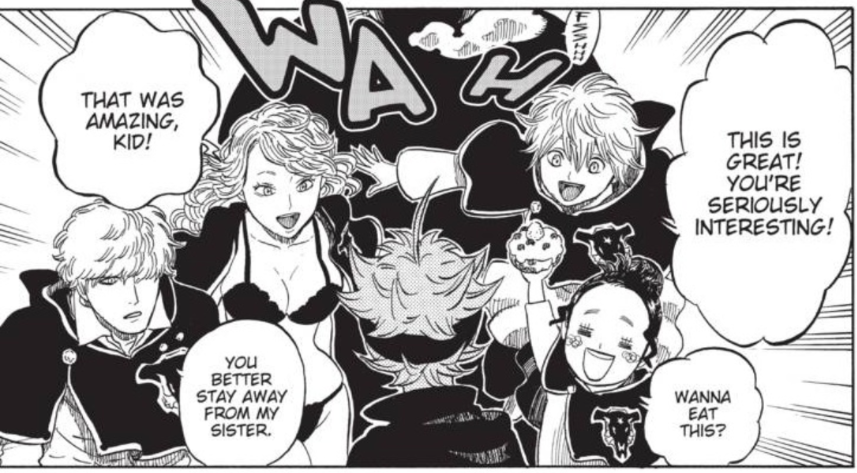
One of the strengths of the book is the clear and concise arcs–they don’t run for an interminable amount of volumes (at least not yet), and they’re all clearly identifiable by their location, supporting cast, and villains, lending every arc a flavor or a mood. This is also how the book makes you more familiar with its large supporting cast. Asta eventually joins a magic knight brigade, the Black Bulls: a group of misfits, freaks, and criminals. Unlike most brigades that typically recruit nobles or talented wizards, the Black Bulls are seen as outcasts or black sheep. This translates to a number of quirky characters who all have their own gimmicks or catch phrases. It’s purposefully overwhelming at first, but with every arc the main characters are highlighted in small groups of one or two, which gives you plenty of chances to see their personality and learn their backstory. They’re all misfits in some form or another, as I mentioned, and their origins are usually high points in the story’s emotional arcs. That’s not to say they don’t have arcs with big team brawls, but the book does a good job of building up to it and making you care about all the involved parties.
I would describe the first action arc as a bit underwhelming, especially if compared to Naruto’s first arc (where they defend the bridge from bandits.) It was a great way to start the series, and opens the scope of the story and really makes the characters grow. Black Clover’s first arc merely hints at a hidden adversary and provides some mouth service to the idea of being “manly.” The best I can say about it is that it starts to lay good foundation for Noelle, the main female lead of the manga. After this first arc, the manga quickly makes it a priority to have tight and memorable arcs with great finales. This makes the manga more enjoyable to follow because the end of arcs don’t feel belabored and bloated.
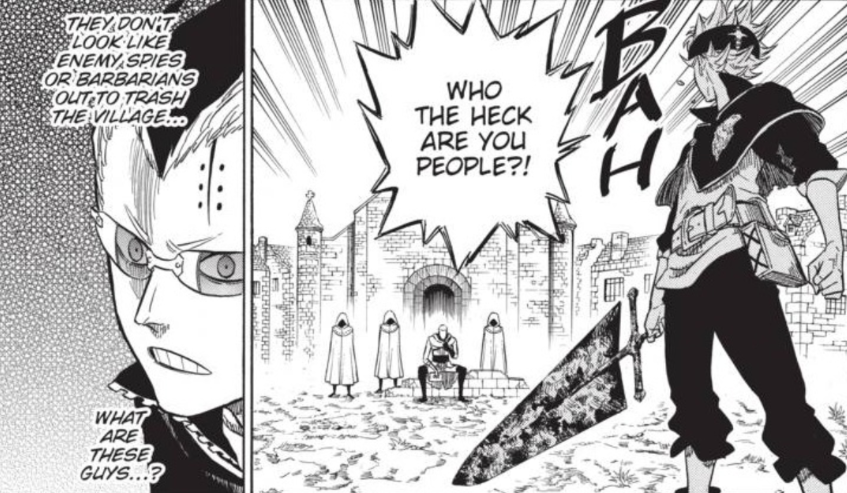
When the next arc starts to warm up its engines, you never feel a sense of dread most shonen readers are familiar with–gazing upon a growing set of villains and plot threads and growing weary, thinking to yourself, “Are they really gonna fight all these guys? Are we really gonna have to learn about all their pasts?” When you feel the “Shonen Dread”™, you know you need a break, or you start to realize the honeymoon is over with a certain series. Black Clover is “Shonen Dread”™ proof thus far. It’s not without some other tomfoolery that I admit might kill a reader’s enthusiasm.
The Thirsty Women of Black Clover
This book has more than one great female lead who is super-engaging, super-cute, super-powerful, and super-attracted to a boorish man. The book usually plays this off as comedic: in the case of the Captain Roselei her stoic demeanor is interrupted when Captain Yami appears. She rarely loses outward composure, but is reluctantly smitten with Yami, leading to inner dialogue that doesn’t match her outward persona. It’s also worth mentioning Captain Roselei leads a women-only brigade and is known to be a man hater, and this sometimes causes embarrassing juxtapositions where she proselytizes the worthlessness of men, but then swoons when she sees her crush. It’s meant to be funny or endearing, but just seems silly and isn’t a good look for the series. Add to that a propensity for women’s clothing to get tantalizingly ripped-off during big fights, and you have a manga that falls for some of the sexist traps common in Shonen books. It’s not all bad with the women, in fact I feel it’s mostly good.
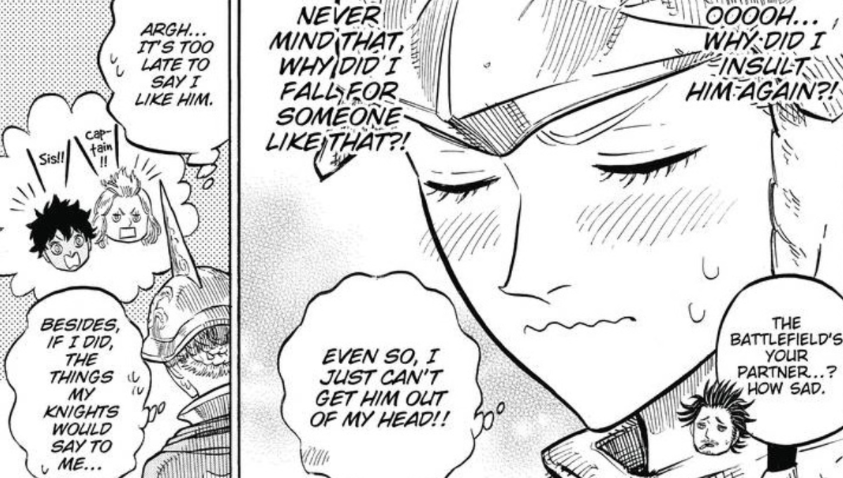
Other women’s crushes are far less complicated than Captain Roseleis’ and usually amount to growing bonds becoming crushes, and good old fashion thirst. This is mainly the case with the various girls that crush on our protagonist, Asta. Black Clover twists the Naruto formula, and the forward guy who’s kinda gregarious but warm is finally way more popular with the ladies than his counterpart, the distant guy who rarely gives people the time of day. Asta is supportive, in short. He’s an honest boy who instantly respects people and advocates for anyone trying to accomplish anything. Whether you want to own your own business, provide for your family, climb the military ranks, or learn to control you powers, Asta is there for you–and not out of a sense of obligation, but simply because he is genuinely impressed that you’re trying to be a better version of yourself. He knows very well the struggle of working towards a goal one may never achieve, and he openly supports people that attempt difficult tasks. This supportive nature, combined with his heroism, makes many girls fall for him. Asta, of course, is of the dense or dimwitted variety, and doesn’t notice, but he isn’t an asexual sort of protagonist.
Probably the most embarrassing aspect of Black Clover’s romances is Asta’s unrequited love for the nun of his village, Sister Lilly. This is problematic in the manga, but exasperated in the anime. In short, Asta is infatuated with the nun from orphanage where he grew up. The initial attachment began when he was a young boy, and it was perhaps forgivable then. But at the start of the series, he is 15 and constantly making advances to Sister Lilly. Asta never takes no for an answer, and insists that she’ll come around, which is more than a little disturbing in this day and age. Honestly, I feel it doesn’t gel well with his character. As mentioned before, Asta instantly respects people, and he advocates for their plights. Conflating Asta’s determination with his romantic aspirations is a bad use of his main character trait and doesn’t do the rest of his persona justice. Of course Sister Lilly is just a side character and basically a recurring joke character; the main love interest, or the one true pairing, if you will, is Noelle.
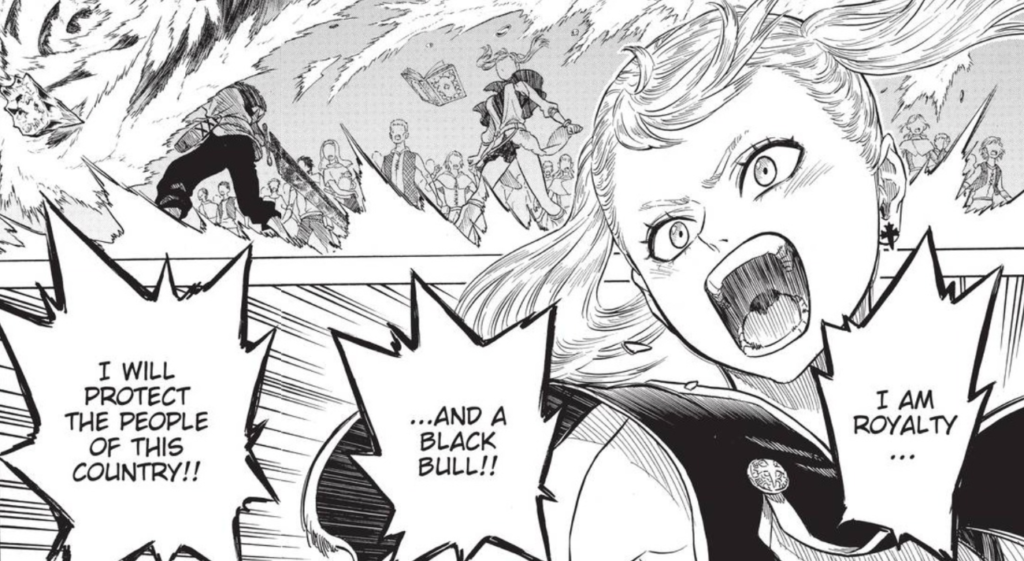
Born with the curse of being the “Sakura stand-in,” Noelle has perhaps the steepest hill to climb in this series. I’m happy to report that Noelle’s arc is far more interesting and thought through than Sakura’s. For one all her main motivational factors don’t involve a boy. All of her drama and origin revolve around her splintered upbringing. She is part of a noble family but she has a problem controlling her magic. This causes the family deep shame and she is basically hidden away, eventually loaned out to the Black Bulls to get her out of their hair.
She has fallen hard for Asta and is a weapons grade Tsundere girl (and also of note is how she is allowed to gawk at the main character’s hot bode–normally reserved for pervy boys, this girl likes the eye candy), but that’s mostly the side of her character that serves her comedy.
In that way, Noelle seems to be the main character of this series: extremely powerful but unable to understand and control her true strength; of noble blood but feeling a strong connection to the discrimination commoners experience; a building urge to protect the innocent and the weak; and explosive growth that knocks the villains on their asses. Noelle has what it takes to be an interesting Shonen protagonist all on her own. Sometimes I consider her as the rightful protagonist because her strengths are measured on the same scales as everyone else’s, unlike Asta, whose power is unique and abhorrent. If Asta is a distillation of a underdog plot, Noelle is a distillation of a Hero’s’ Journey.
The Future is Bright and Full of Yelling and Punching
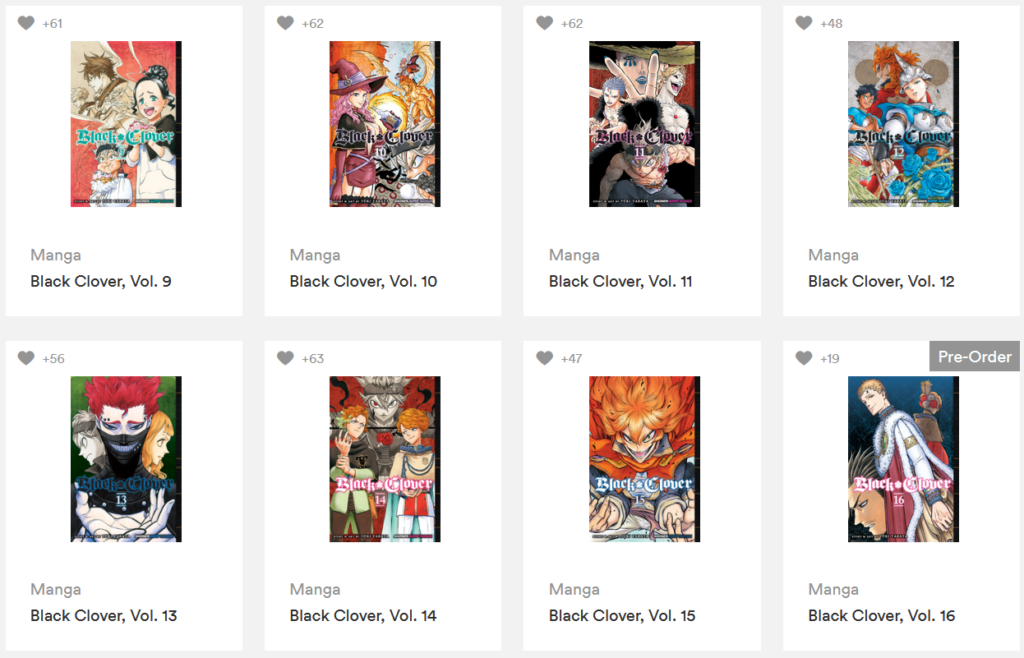
Reviewing any long-running Shonen book has its risks: the series could crap out and do various bad arcs, or the sexist jokes can become more frequent and toxic. I don’t know how long Yuki Tabata plans on continuing Black Clover, but there are still many mainstay troupes of Shonen books it hasn’t quite touched yet. Time skips, villains becoming good guys, good guys becoming bad guys–these are all things I fully expect to happen at some point, and a couple of them kind of have already. Regardless as it is now, Black Clover is a great series and it only gets better at the time of this writing.

